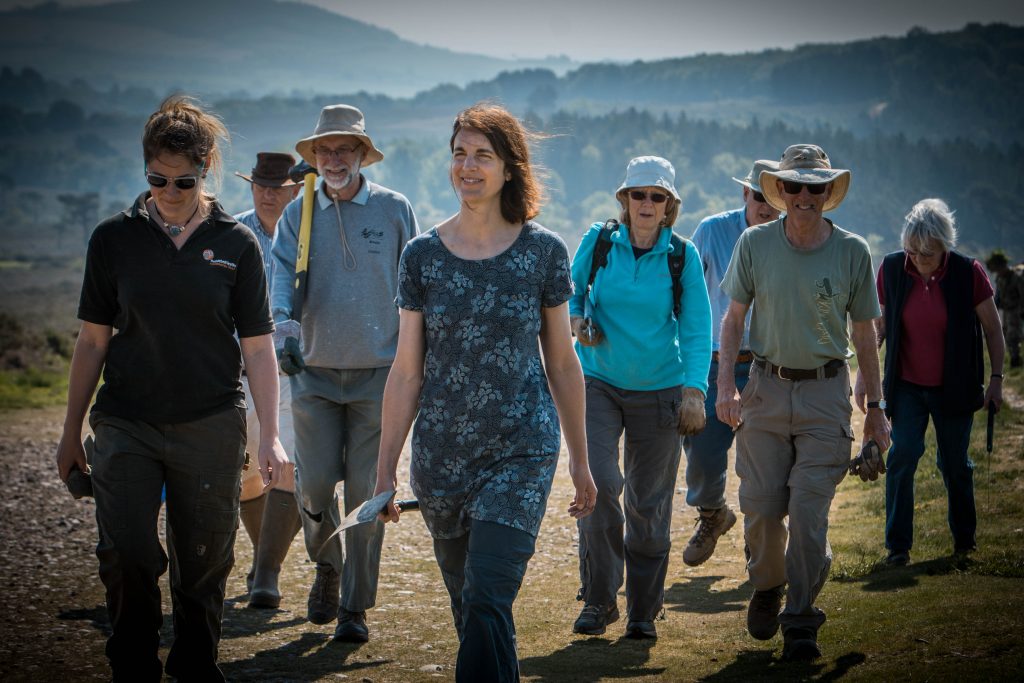An Exeter University research project exploring the links between environment and health and wellbeing has revealed that the economic value of the East Devon Pebblebed Heaths in relation to human health is worth at least £450,000 a year.
The Pebblebed Heaths are recognised as one of the most important conservations sites in Europe, covering around 1,100 hectares across Woodbury Common and its adjacent commons.
Dr Carolyn Petersen, postgraduate research associate for the university’s politics department launched the project, ‘Understanding and quantifying the health and wellbeing value of the East Devon Pebblebed Heaths’ in partnership with Clinton Devon Estates, which owns the core area of heathland, in November.

The short research project is one of only 10 nationally to receive funding by the Natural Environment Research Council as part of its Valuing Nature programme, with the objective of quantifying the site’s economic health and wellbeing value.
In order to make the calculation Dr Petersen used the World Health Organisation’s Health Economic Assessment Tool, designed to assess the health benefits of walking and cycling, combined with data from a visitor survey of the Heaths undertaken by ecological consultancy, Footprint Ecology.
“The economic value of the Pebblebed Heaths relating to health and wellbeing is extensive and is calculated at more than £450,000,” Dr Petersen explained. “This is the minimum value that can be attributed to health benefits of people walking on the Heaths, because it is based on figures for only the estimated 3,000 visitors who visit the Heaths very frequently and does not include the considerable mental health benefits that visitors get from spending time there, as these are currently much harder to quantify.”
Dr Petersen’s research also revealed that visitors, predominantly from the surrounding areas including Exmouth and Exeter, are prepared to spend around £1.9m on travel costs to and from the Heaths each year.
The project also involved a workshop at the recently launched Budleigh Salterton Health and Wellbeing Hub with private, voluntary and public sector organisations exploring how a partnership approach could further enhance the health and wellbeing value of the site.
Representatives from 17 organisations took part, including from the Devon Countryside Access Forum, the RSPB, the Devon Wildlife Trust, Active Devon, the Otter Valley Association, LED Walking for Health, town, district and county councils and GPs’ surgeries.
Strategies include improving the coordination of existing activities; expanding consultation of key stakeholders, for example disability groups; increased targeting of activities, such as group walks to include more disadvantaged groups, older people and/or people with specific health needs; securing funding sources to support health and wellbeing outcomes, and influencing policy.
Dr Petersen continued: “The research has enabled us to demonstrate that there are quantifiable benefits to people exercising on the Heaths and reconfirmed how essential exercise in the outdoors is to people’s overall health.
“Ultimately, we want society and policy makers to appreciate that the Pebblebed Heaths, along with other biodiverse natural environments, are an amazing public resource and should be valued and protected, not just for their wildlife, but for the full range of benefits they provide for local communities. This is particularly important given the uncertainties in future funding for the environmental sector as a result of the UK’s decision to leave the European Union.”
Kim Strawbridge, Pebblebed Heaths Site Manager, added: “We have long known that the East Devon Pebblebed Heaths have a huge cultural value, in addition to the 3,000 species it supports.
“Sited on common land, hundreds of years ago the Heaths once provided local communities with the bare necessities of life including timber, fodder, fuel and food. Today people value the site more for its recreational benefits with walking, cycling and riding all important pastimes.
“Dr Petersen’s work is really important as it enables us to enhance our understanding of the full cultural value of the site and has provided a framework for how we might improve this value in the future.”
Full report download Understanding and quantifying the health and wellbeing value of the East Devon Pebblebed Heaths and exploring the potential of partnership working involving private sector organisations
Summary report download Summary report Understanding and quantifying the health and wellbeing value of the East Devon Pebblebed Heaths